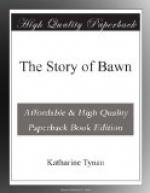“I wish you would come and be thanked,” I answered in a low voice. I had the oddest reluctance to leave him, with no prospect of ever seeing him again.
“Who knows but we may meet again?” he answered, yet did not offer to tell his name, and I felt shy of asking it.
I turned back on the doorstep when I had come to it, and saw across the lawn and shrubbery his shadowy shape standing at the edge of the wood. I waved my hand to him and he lifted his hat. The sun looked out for the last time from under a purple cloud and I saw him plainly. While I gazed towards him the darkness came again and I lost him; and there was Neil Doherty, our butler, opening the door to me and upbraiding me as he had done when I was a small child.
“Musha, where have you been stravaigin’ to, Miss Bawn? and her Ladyship in and out like a dog at a fair, axin’, ‘Is Miss Bawn in yet, Neil?’ His Lordship doesn’t know, glory be, or maybe ‘tis havin’ a bad attack of the gout he’d be. If I was you, Miss Bawn, I’d give up the Creamery, so I would, or lave it to the commonalty! Sure ’twould be fitter for the like o’ you to be sittin’ at home in the drawing-room, playin’ the piano-forty. Yes, your Ladyship, here she is at last. I was just tellin’ her that your Ladyship was like a hen on a hot griddle waitin’ for her.”
“Dear child, you are late,” my grandmother said, breaking in on Neil’s eloquence, which indeed generally had to be interrupted, for once Neil started there was no knowing when he would leave off.
“It was Dido,” I said, telling half the truth. Not for worlds could I have told my grandmother of how Richard Dawson had insulted me. “It was Dido, who caught her foot in a trap. It was an old rusty trap. I do not know how long it can have been there. But it held Dido fast, and she would not let me leave her. I should have been there still if it had not been for the timely help of a gentleman who was passing through the wood and heard her yelping. She made enough noise to wake the dead.”
“Ah, poor Dido!”
My grandmother’s attention was diverted to the dog, who was especially dear to her for Uncle Luke’s sake. She sat down now in the great hooded chair which was supposed to belong to Neil Doherty, only that he did so many things in the house that he never had much time for sitting in state in the hall. She took Dido’s paws in her lap and began anxiously to examine them for any injury, while the dog moaned with self-pity.
“I don’t think she has any hurt,” I assured her. “The trap did not altogether meet on her paw, although it held her a prisoner.”
Neil Doherty looked on with an interested face.
“Twould be a kindness to the poor baste,” he said, “to drown her, not to be keepin’ her alive. Sure, what has she to live for?”
My grandmother looked up at him with a sudden illumination of her face.
“Who knows, Neil,” she said, “but Dido may have something to live for yet? And that the thing others of us are living for?”




